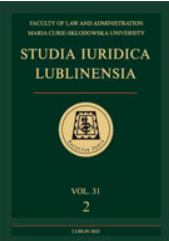New or Just Amended? On the Legality of the “Major Change” to the Constitution of the Republic of Poland
New or Just Amended? On the Legality of the “Major Change” to the Constitution of the Republic of Poland
Author(s): Dariusz DudekSubject(s): Law, Constitution, Jurisprudence, Constitutional Law
Published by: Wydawnictwo Naukowe Uniwersytetu Marii Curie-Sklodowskiej
Keywords: constitution; amendment to the constitution; legality; referendum
Summary/Abstract: The article has a scientific and research dimension and addresses an important problem related to the most fundamental legal act of the Polish legal system, i.e. the Constitution of the Republic of Poland of 1997. The problem concerns the decision whether it is legally permissible and lawful in the light of this Constitution to amend it as a whole, i.e. adopt a new constitution with the simultaneous repeal (derogation) of the current one, or on the contrary: the Constitution of 1997 can only be amended (partially amended), but as a normative act de lege lata it is “unrepealable”. Although a number of publications have tackled the issues of the process of adopting and amending the constitution of Poland and other states in the scientific literature, an original position on this subject has recently been presented. According to Professor Janusz Trzciński, the current constitution rules out the admissibility of its overall change, and for such a process, it would be necessary to amend it in advance, clearly providing for (introducing) the possibility of such a comprehensive modification. The author of this article puts forward an opposite thesis: the Constitution of the Republic of Poland of 1997 is not an immutable act, and its Article 235 does not preclude its application for the procedure of adopting a new constitution, combined with the repeal of the binding force of the existing constitution. The novelty of the research results lies not so much in the thesis itself (in Polish science such a view dominates), but rather in the argumentation behind it, covering not only dogmatic-legal aspects, but also historical and comparative ones. This means a certain new cognitive value in the sphere of science, which also has a potential application value, i.e. it can be taken into account in the event of a possible legislative work in the Polish Parliament aimed at adopting a new constitution.
Journal: Studia Iuridica Lublinensia
- Issue Year: 31/2022
- Issue No: 5
- Page Range: 35-53
- Page Count: 19
- Language: English

